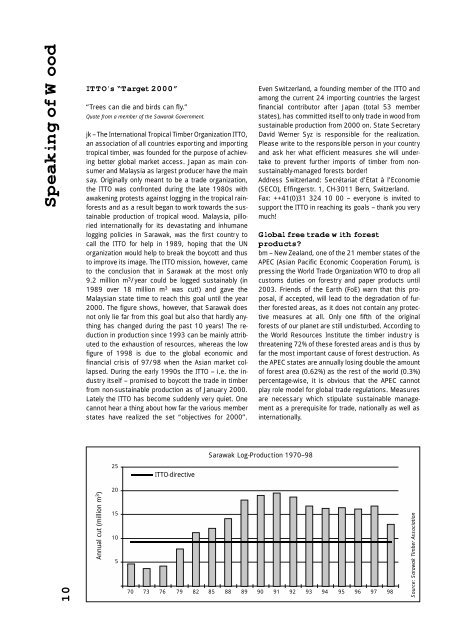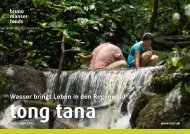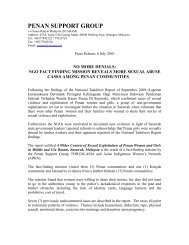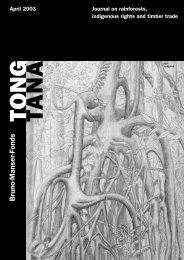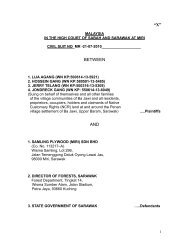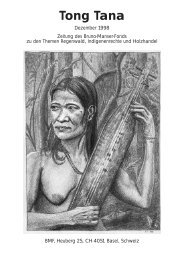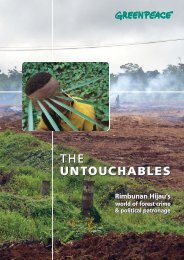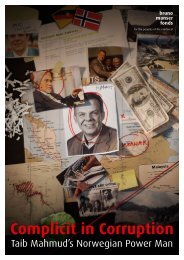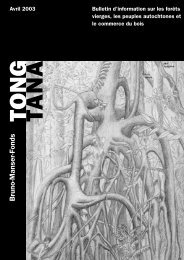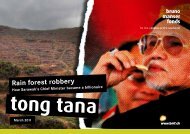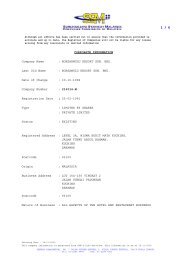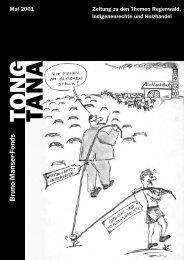Tong Tana December 1999 - Bruno Manser Fonds
Tong Tana December 1999 - Bruno Manser Fonds
Tong Tana December 1999 - Bruno Manser Fonds
You also want an ePaper? Increase the reach of your titles
YUMPU automatically turns print PDFs into web optimized ePapers that Google loves.
Speaking of Wood<br />
ITTO’s “Target 2000”<br />
“Trees can die and birds can fly.”<br />
Quote from a member of the Sawarak Government.<br />
jk – The International Tropical Timber Organization ITTO,<br />
an association of all countries exporting and importing<br />
tropical timber, was founded for the purpose of achieving<br />
better global market access. Japan as main consumer<br />
and Malaysia as largest producer have the main<br />
say. Originally only meant to be a trade organization,<br />
the ITTO was confronted during the late 1980s with<br />
awakening protests against logging in the tropical rainforests<br />
and as a result began to work towards the sustainable<br />
production of tropical wood. Malaysia, pilloried<br />
internationally for its devastating and inhumane<br />
logging policies in Sarawak, was the first country to<br />
call the ITTO for help in 1989, hoping that the UN<br />
organization would help to break the boycott and thus<br />
to improve its image. The ITTO mission, however, came<br />
to the conclusion that in Sarawak at the most only<br />
9.2 million m 3 /year could be logged sustainably (in<br />
1989 over 18 million m 3 was cut!) and gave the<br />
Malaysian state time to reach this goal until the year<br />
2000. The figure shows, however, that Sarawak does<br />
not only lie far from this goal but also that hardly anything<br />
has changed during the past 10 years! The reduction<br />
in production since 1993 can be mainly attributed<br />
to the exhaustion of resources, whereas the low<br />
figure of 1998 is due to the global economic and<br />
financial crisis of 97/98 when the Asian market collapsed.<br />
During the early 1990s the ITTO – i.e. the industry<br />
itself – promised to boycott the trade in timber<br />
from non-sustainable production as of January 2000.<br />
Lately the ITTO has become suddenly very quiet. One<br />
cannot hear a thing about how far the various member<br />
states have realized the set “objectives for 2000”.<br />
Even Switzerland, a founding member of the ITTO and<br />
among the current 24 importing countries the largest<br />
financial contributor after Japan (total 53 member<br />
states), has committed itself to only trade in wood from<br />
sustainable production from 2000 on. State Secretary<br />
David Werner Syz is responsible for the realization.<br />
Please write to the responsible person in your country<br />
and ask her what efficient measures she will undertake<br />
to prevent further imports of timber from nonsustainably-managed<br />
forests border!<br />
Address Switzerland: Secrétariat d’Etat à l’Economie<br />
(SECO), Effingerstr. 1, CH-3011 Bern, Switzerland.<br />
Fax: ++41(0)31 324 10 00 – everyone is invited to<br />
support the ITTO in reaching its goals – thank you very<br />
much!<br />
Global free trade with forest<br />
products<br />
bm – New Zealand, one of the 21 member states of the<br />
APEC (Asian Pacific Economic Cooperation Forum), is<br />
pressing the World Trade Organization WTO to drop all<br />
customs duties on forestry and paper products until<br />
2003. Friends of the Earth (FoE) warn that this proposal,<br />
if accepted, will lead to the degradation of further<br />
forested areas, as it does not contain any protective<br />
measures at all. Only one fifth of the original<br />
forests of our planet are still undisturbed. According to<br />
the World Resources Institute the timber industry is<br />
threatening 72% of these forested areas and is thus by<br />
far the most important cause of forest destruction. As<br />
the APEC states are annually losing double the amount<br />
of forest area (0.62%) as the rest of the world (0.3%)<br />
percentage-wise, it is obvious that the APEC cannot<br />
play role model for global trade regulations. Measures<br />
are necessary which stipulate sustainable management<br />
as a prerequisite for trade, nationally as well as<br />
internationally.<br />
25<br />
ITTO-directive<br />
Sarawak Log-Production 1970–98<br />
20<br />
10<br />
Annual cut (million m 3 )<br />
15<br />
10<br />
5<br />
70 73 76 79 82 85 88 89 90 91 92 93 94 95 96 97 98<br />
Source: Sarawak Timber Association


